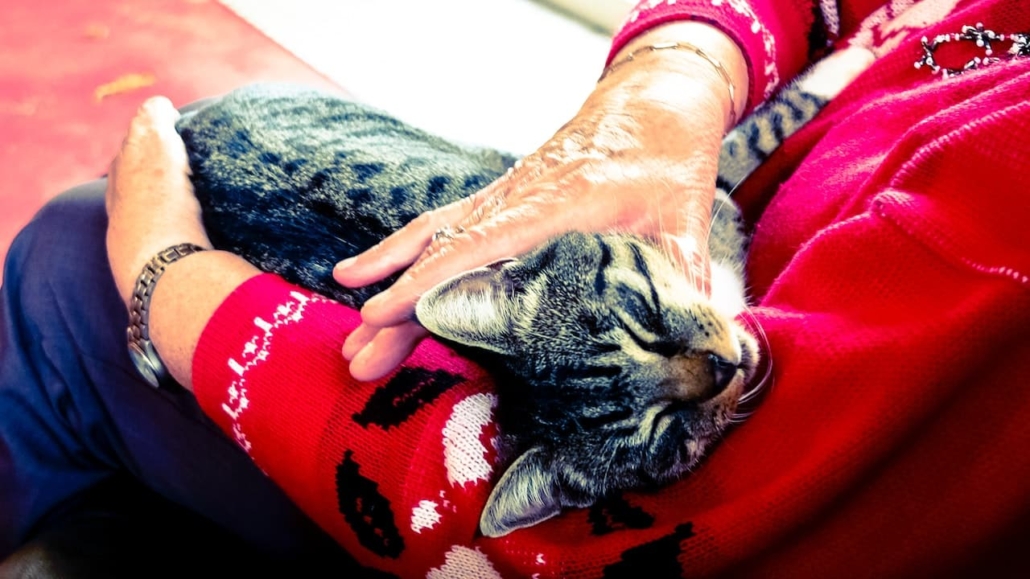Pets are awesome, and I am not writing that just because my cat said so! All of us who had the good fortune of spending time with either our pets or pets of friends and relatives know how much joy they can bring to our lives. Pets can be our companions, members of our family and the ones who provide moral support when finalizing that dreaded conference presentation at 1 am!
As a cat parent, I would argue that spending time with pets is fantastic at any age. What fascinates me though is the ability of pets to be at our side and love us unconditionally as we get to grips with the sometimes difficult and emotional process of aging. It is well known that pets can have a beneficial psychological and biological effect. They can help us relax which in turn lowers our heart rate and blood pressure, reduce stress and thus lower the levels of the stress hormone, cortisol, and they can even increase the levels of our body’s “happy hormone”, serotonin. But pets are not just something that reduces our stress and improves our mood. We love our pets and we care for them. Much like good friends and family members, they become part of our life and our daily routine interwinds with their daily routine. We live with them, relate to them and communicate with them. Thus, our pets can motivate and help us to stay active and stick to a healthy daily routine and habits.
Pets can also be beneficial for our loved ones with dementia. Their calming effect can help reduce agitation, their constant companionship can reduce feelings of loneliness and isolation and provide comfort and safety. Most importantly pets have an ability that seems almost magical. They can communicate without language! Even when a loved one struggles to communicate with words, they are probably still able to communicate with the family pet and enjoy their relationship with it. Petting and cuddling is a universal language that all pets understand and furthermore, pets that have grown with us can intuitively understand how we feel and what we want. Pets can also bring the family together. As all family members care for the pet the barriers in communication imposed by dementia are lowered as the pet acts as a mediator between family members.

Still, caring for a pet can be daunting for a person dealing with cognitive of physical issues. A bit of planning and some help is needed in order to be able to care for our pets as we age. As you might have expected, I will advocate for the role of technology in helping us live with our pets. Robotic pet toys, automatic feeders and self-cleaning litter boxes make pet care a lot easier while GPS trackers ensure our pets don’t stray too far from our backyard. Technology is not a magic bullet though. What is even more important is the role of family and community. A good support network can provide assistance and ensure that a loved one and their pet stay healthy and can manage their daily activities. Often a pet is cared for by the whole family so it is easier to adapt when an older loved one has some physical or cognitive limitations. For older adults who live alone, frequent visits by friends and family can make pet care easier.
At this point, it is important to stress the benefits of interaction with animals even for older adults who don’t have a pet. A weekly visit by a friend’s pet could bring joy and allow an older loved one to spend some time with a pet even if they are not able to have their own pet at home. Some nursing homes are also able to care for residents and their pets while other facilities may have pets that live on the facility or visit the facility at certain days to provide companionship to residents. Each person’s aging journey and living situation is unique so adaptability and a willingness to realistically assess opportunities and limitations is necessary to ensure that all older adults can enjoy the benefits of interacting with pets.
What can I do?
- As an older adult: Think about where you could use some assistance in caring for your pet. Research technological solutions and ask your friends and family for support
- As a relative: Talk with your loved ones about their pets and see what kind of assistance they may require. Spend some time with them and their pets to see if there are any issues, they are not aware of or any potential safety risks for them and their pets
- As an assisted living or nursing home owner / manager: Try to make your facility pet friendly. If it is impractical to care for your resident’s pets or keep pets at the facility, liaise with a pet therapy service who can visit the facility and enable your residents to spend time with pets.
Disclaimer: My cat, Freyja, helped me write this article. She has been adequately compensated for her effort with treats and cuddles.



